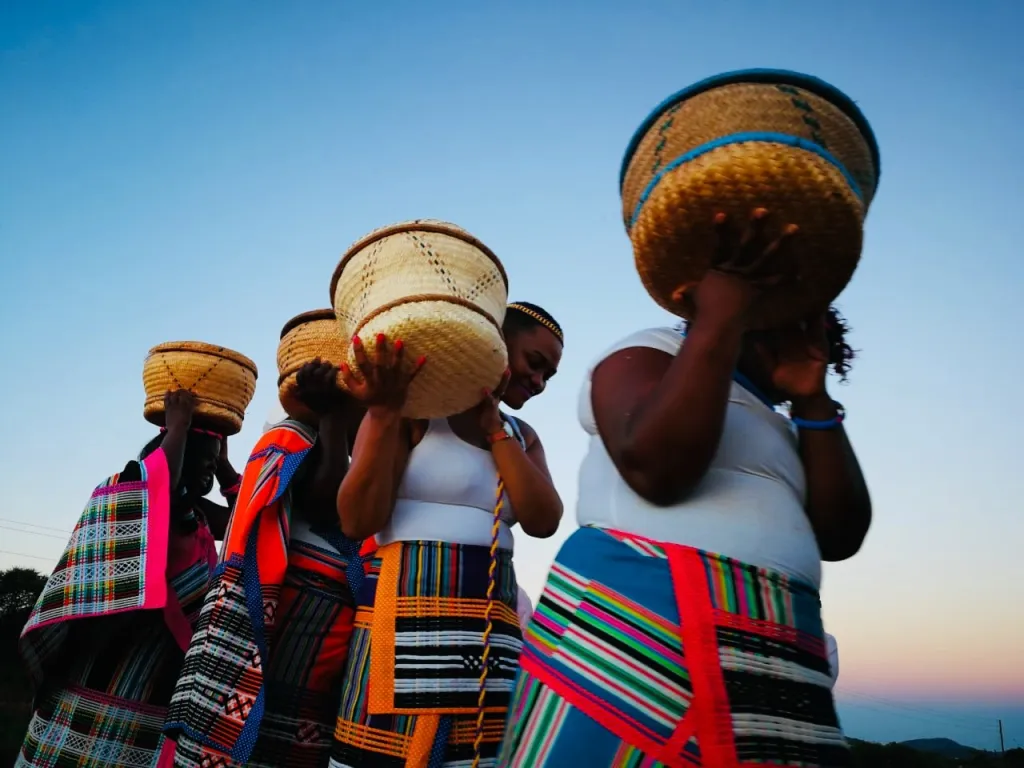Venda Lessons 101 – Learn to Speak Tshivenda

Welcome to Venda Lessons 101 – Learn to Speak Tshivenda! Tshivenda, often referred to simply as Venda, is one of South Africa’s eleven official languages. It is primarily spoken by the Venda people in the northeastern parts of Limpopo Province. Rich in cultural history and noted for its complex grammar and vocabulary, Tshivenda is a language that resonates with the heritage of its people.
On this page, we will dive into the most famous and popular phrases in the Tshivenda language to help you learn how to speak and communicate effectively in this beautiful language. Whether you’re planning a visit to the Venda region, looking to connect with its culture, or simply expanding your linguistic skills, mastering these phrases will give you a fantastic foundation in Tshivenda. Let’s get started and explore the vibrant world of Venda together!
Popular Phrases in Tshivenda
How do you say hello in Tshivenda?
To say hello in Tshivenda, females typically use “Aa” while males say “Ndaa” or “Nndaa”, emphasizing the “N” sound. The response from the other person will also vary based on their gender.
This gender-specific manner of greeting not only reflects the cultural nuances of the Venda people but also adds a layer of respect and acknowledgment in social interactions. By using these greetings, speakers immediately convey their gender in a subtle and culturally significant way, which influences how conversations are structured.
How do you say I love you in Tshivenda?
To say “I love you” in Tshivenda, you must say “Ndi a ni funa”. The words individually translate to “ndi” (I), “a” (love), and “ni” (you). To express reciprocal love, you would say “Na nne ndi a ni funa”, which means “I also love you.”
Using this phrase in Tshivenda communicates deep affection and personal attachment. It is a direct and meaningful way to express feelings, reflecting the importance and intensity of the emotion in the Venda culture. The structure of the phrase helps emphasize the sincerity of the sentiment being expressed.
Can you hear me in Tshivenda?
To ask if someone can hear you in Tshivenda, you say “Ni kho umpfa naa?” which translates directly to “Can you hear me?”
This phrase is particularly useful in ensuring clear communication, especially in situations where verbal feedback is necessary to confirm understanding or attention. It highlights the interactive nature of communication in Tshivenda, emphasizing clarity and mutual engagement in conversations.
What is yes in Tshivenda?
To affirmatively respond or say “yes” in Tshivenda, you use the word “Ee”.
This straightforward affirmation is central to Tshivenda communication, used in agreeing, acknowledging, or accepting during conversations. The simplicity of the word makes it easy to remember and effective in fostering clear and positive interactions.
What is God in Tshivenda?
In Tshivenda, “Mudzimu” or “Nwali” refers to God. Other names for God in Tshivenda include “Mune washu” meaning our master, “Khotsi a shu” meaning our father, “Ramakole” meaning the owner of clouds, “Yehova” meaning Jehovah, and “Musiki” meaning the creator.
These diverse names reflect the deep spiritual and cultural connections the Venda people have with the divine. Each name represents different aspects or attributes of God, emphasizing His significance in their daily life and spirituality.
How do you greet a girl in Venda?
To greet a girl in Venda, you would say “Aa” if you are female or “Ndaa” if you are male, both meaning hello, then after you would put a noun to indicate a girl. You could say ndaa “khaladzi” = which means hello sister. Additional phrases include “Hurini” or “Hurini naa”, meaning “How are you?” or “How is it going?” Another way to ask how someone is doing is by saying “Hu to ita hani?” which also translates to “How are you?”
These greetings are crucial in social interactions, showing politeness and interest in the person’s wellbeing. They help in establishing a connection and are a fundamental part of daily communication in Venda culture.
What is a friend in Venda?
In Venda, a friend is referred to as “Mungane”, “Thama”, or “Khonana”.
These terms signify the bond and close relationship between individuals. Each word can be used in slightly different contexts or based on personal preference but all convey the importance and value of friendship within the Venda community. Using these words, individuals express companionship, trust, and mutual respect.
What is happiness in Venda?
In Venda, the word for happiness is “Dakalo” or “Madakalo”. A common phrase to express a joyful day would be “Namusi ndi duvha la dakalo”, which translates to “Today is the day of happiness.”
The concept of happiness in Venda culture is often shared and celebrated communally. Expressing joy through language not only reflects personal feelings but also enhances social bonds and collective well-being. Phrases like these are used during celebrations, gatherings, or in any context that brings joy, emphasizing the value of happiness in the Venda community.
What is father in Tshivenda?
In Tshivenda, the word for father is “Khotsi” or “Baba”.
These terms are deeply respectful and affectionate, used commonly in both family contexts and broader social interactions. “Khotsi” and “Baba” denote not only biological fatherhood but also respect and authority within a community or family, highlighting the revered position of fathers in Venda culture.
What is a Princess in Tshivenda?
In Tshivenda, a princess is referred to as “Mukololo”.
The title “Mukololo” carries cultural significance, denoting not only royal bloodline but also the social responsibilities and respect accorded to female members of the royal family. The term is used within communities to acknowledge the stature and respect that come with her role, which often includes cultural and ceremonial duties.
What is a husband in Venda?
In Venda, the word for husband is “Munna” or sometimes “Khotsi”, the latter also meaning father.
The use of “Khotsi” in this context underscores the role of a husband as not just a spouse but a father figure and a pillar in the family structure. “Munna” directly refers to a male partner in marriage, emphasizing his role and responsibilities within the household. These terms reflect the culturally embedded roles that define family dynamics in the Venda community.
What is a Venda person called?
A Venda person is called “MuVenda.” In a sentence, you might say “Nne ndi muVenda”, meaning “I’m a Venda person.”
This terminology reflects both ethnic identity and linguistic affiliation. The term “MuVenda” is widely used to denote an individual who belongs to the Venda community, highlighting their cultural heritage and association with the Venda people of South Africa.
What is freedom in Venda?
In Venda, the word for freedom is “Mbofholowo”. To express the state of being freed, you would say “To vhofhololwa”, meaning “we have been freed.”
This term encapsulates the concept of liberation and the joy associated with gaining freedom, whether it be political, social, or personal. It is a powerful expression within the context of South Africa’s history and resonates deeply in celebrations of freedom and independence.
Is Venda similar to Shona?
Yes, Venda and Shona share linguistic similarities and are part of the Bantu language family. Both languages have common linguistic structures, vocabulary, and syntax, which point to their historical connections and mutual influences.
This relationship enhances the cultural and linguistic bonds between the Venda and Shona-speaking peoples, illustrating the interconnectedness of the regions where these languages are spoken.
What is salt in Venda?
The word for salt in Venda is “Muno”.
Salt, an essential dietary mineral and a crucial ingredient in cooking, holds a significant place in daily life and cultural practices, including food preservation and flavoring.
Which language is closest to Venda?
Shona and Sepedi are the languages closest to Tshivenda.
These languages share several linguistic features with Tshivenda, including phonetic sounds, vocabulary, and grammatical structures, indicating a close historical and cultural proximity. This similarity allows for some mutual intelligibility among speakers of these languages, reflecting their shared origins within the Bantu language group.
What are the love phrases in Venda?
In Venda, expressions of affection are rich and varied. Some common love phrases include:
- “Ndi a ni funa” (I love you)
- “Muthu wanga” (my person)
- “Nyanenge wanga” (my love)
- “Khomba yanga” (my girl)
- “Dzivha la mbilu yanga” (the love of my heart)
These phrases are deeply expressive and used to convey affection and deep emotional connections within relationships. Each phrase enriches the Venda language’s romantic vocabulary, allowing speakers to articulate their feelings with sincerity and cultural authenticity.
What is the translation of “I love you” to Venda?
The translation of “I love you” to Venda is “Ndi a ni funa.”
This straightforward translation carries a profound emotional weight, encapsulating love and affection in a simple yet powerful phrase. It is a direct way to express one’s feelings to another, holding a universal appeal that transcends linguistic boundaries.
What does “Ndo neta” mean?
“Ndo neta” means “I am tired.” For example, in a sentence, “Ndo neta nga u shuma ndi sa holi”, it translates to “I’m tired of working without payment.”
This phrase is commonly used to express physical or emotional fatigue. It can be applied in various contexts, whether discussing work, personal efforts, or general life situations, reflecting the speaker’s need for rest or a change.
What does “Ndi a ni funa” mean?

“Ndi a ni funa” means “I love you.”
This phrase is a declaration of love and is among the most heartfelt expressions in any language. In Tshivenda, it serves as a powerful affirmation of affection, often used in romantic contexts to express deep emotional connections between individuals.
How are you doing in Venda?
To ask someone how they are doing in Venda, you can say “Hu to u ita hani?” or simply “Hurini,” both translating to “How are you?”
These phrases are common conversational starters used to inquire about someone’s wellbeing in a polite and caring manner. They can be used in various social contexts, reflecting the speaker’s interest in the personal state of the listener.
How do you say “I’m fine” in Venda?
To express that you are doing well in Venda, you can say “Ndo takala” or “Nne ndi hone,” both meaning “I’m fine.”
These responses are typical follow-ups to “How are you?” in daily conversations, providing a positive affirmation about one’s state. They help maintain a light and friendly interaction, reassuring the inquirer of the speaker’s good condition.
Where do you stay in Tshivenda?
To ask someone where they live in Tshivenda, you would say “Ni dzula gai?” The response might be “Nne ndi dzula Thohoyandou,” meaning “I stay in Thohoyandou.”
This question is useful for getting to know more about someone’s living arrangements or simply as part of a conversation. It can help establish a connection or give context to further discussion about local issues or experiences.
What is hate in Venda?
The word for hate in Venda is “Vengo.” To express the action of hating, you would say “U vhenga.” If you want to say “I hate you,” it would be “Ndi a ni vhenga.”
Understanding expressions of negative emotions like hate is also important as it reflects more complex human interactions. These phrases, while not commonly used in polite conversation, are part of the emotional spectrum covered in the Tshivenda language, providing words for various feelings and states of being.
